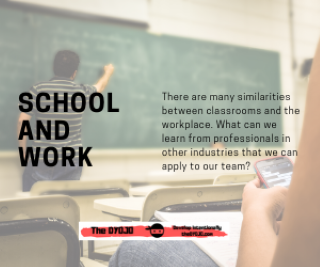Developing your growth mindset is accelerated by learning from professionals in other industries. The classroom and the workplace are similar The classroom and the workplace are similar I find it interesting that the students that teachers are dealing with today in their classrooms are going to be the work force of tomorrow that business leaders will be working with. In this way, our efforts and futures are aligned. Educators must find ways to reach and teach young children from a variety of backgrounds, needs and cultures. Employers must find ways to attract, develop and retain individuals entering the labor pools. A good friend of ours works in the school system helping with positive behavior interventions. What is a behavior intervention you may ask? Simply put, when a student is having an issue at school and acts out, how do we assist them to a positive outcome? I would like to point out that first, this is not a deep dive into the behavioral sciences or our education system. This is a dip of the toe into another arena to explore issues, discussions and solutions that may assist us in our own progress. We ran through a similar exercise with an article published with The Institute of Workplace and Facilities Management (IWFM) in reviewing best practices in the criminal probation system. Secondly, opinions, like belly buttons, are abundant. I am sure the reader has their opinions on these matters. If you are willing to journey for a moment into this scenario, I believe you will learn something that will be helpful to your personal and professional development. Developing the skill to succeedAs a member of the behavior team for a local elementary school you have been trained in positive behavior intervention and supports (PBIS). The system has been set up with three tiers of prevention with plans of support associated with the needs of the student at each tier.
Does this sound familiar in the workplace? As a team we establish our vision and operate out of our core values. For the majority of our team members the culture provides a “universal prevention” that inspires alignment within the team. Those in a position of leadership (PIAPOL) know the feeling of working with “some” who need targeted plans and “few” who need intensive efforts. Teachers, para educators and staff will have had training with universal preventions and resources for supporting students. When a student has been identified as needing Tier 2 or Tier 3 support, the process includes getting all stakeholders which may include parents, school specialists and professionals who are working with the student together to design a support plan. To reach our goals as an organization we outline our follow through with these tiers in language such as followed by all (FBA) or key performance indicators (KPI). In the world of PBIS the language they use states that implementation must be practiced with fidelity. So, let’s take our journey into a PBIS scenario with our eyes and ears open for nuggets of truth that are applicable to our roles and responsibilities in business. You are called to a classroom to assist a teacher who is working with a student that has escalated beyond their control. You arrive in the classroom. The teacher is upset. There is a small child who is upset. The rest of the class is unable to be managed properly due to the disruption. You ask the teacher, “What transpired?” The teacher explains, “I instructed the class to color a rainbow and to start with the color purple.” The child declared, “I don’t want to start with purple, I want to start with orange.” In that moment, the teacher had a choice. As an important piece of background, we should note that this particular student has oppositional defiant disorder (ODD). We may be losing some of you who are starting to think that sounds like a made up issues that simply describes a disobedient child. How many of you are thinking that this child just needs better parenting, real consequences or any number of common opinions (belly buttons)? Oppositional defiance, in base terms, means the child will do the opposite of what they are instructed. If the situation escalates, the child will escalate as well. Hopkins Medicine outlines that the scientific community has not unanimously agreed, as with many behavioral complexities, whether the sources of ODD are developmental or learned. Even the health community has their belly buttons in a jam. Back to the teacher’s choice. The guiding principle is supposed to be the behavior support plan. All of the stake holders for this student have developed a plan that is unique to the student and has been agreed to by all. Fidelity in implementation is key to PBIS progress. Developing the will to succeedThe will to succeed is different than the desire to achieve success. As we have discussed before, Vince Lombardi, regarded as one of the greatest football coaches of all time, has said, “The will to win is not nearly so important as the will to prepare to win.” If we want to develop our will to succeed, we have to clarify our vision and work to get everyone rowing in the same direction. We prepare to win. At moments like this, our will to succeed is tested. Our will to follow the plan is directly associated with our ability to progress in our process. The teacher can choose to go with the plan, which in this scenario of opposition by the child would mean they should say, “Do it or don’t,” and then proceed with classroom instruction. Easier said than done in the moment but having the will to succeed means following the plan especially when the plan is tested (fidelity). On this day, the teacher choose not to go with the plan. This can be a reaction out of frustration, exhaustion or any number of factors a teacher faces when instructing a class full of students. How often does this happen in a work setting as well? “I just want my class to move forward smoothly and this child is being oppositional about a very mundane instruction,” would be a natural thought. So, the teacher engaged, “Please don’t use orange, I told you to use purple. The rest of the class is using purple.” The student responded, “I don’t want to use purple, I am using orange,” and went on to color more vigorously. “Look at this student, they are using purple,” the teacher appealed to positive peer pressure hoping to get a better response even though they know the situation was beginning to escalate. Developing the chill to succeedAs this situation unfolds, the student with oppositional defiant disorder is responding to the rising tension which naturally frustrates the teacher. Teacher knows they should be following the plan, engaging the will to succeed with the chill to succeed in the moment. “Please do as you are told, you are making a scene,” the teacher states. “No.” Now the attention is fixed on the child which adds fuel to the fire. The plan was not followed. Fidelity misfired and progress is stilted. Please understand this is not meant to pick on the teacher in this scenario, only to point out the disconnect. We are back to the point where the behavioral support team arrived. Behavior support staff are not better than teachers, they just have a specific area of training to assist in these areas of need. The behavior support team member says, “We need to clear the room.” The teacher knows this is in accordance with the behavior plan. In this scenario the child needs space to de-escalate so that the plan can be brought back into play. The keys to success with positive behavior interventions include understanding the unique needs of individual children, developing relationships, creating personalized plans and equipping stake holders to carry out the process. Skill alone does not lead to success. All three elements are necessary. As a team, each member needs to have the will to succeed, the chill to succeed and the skill to succeed. We commit to clarifying our vision, executing our plan consistently and holding each other accountable to rowing in the same direction. The will to succeed. When working with behavior support it is important to understand that it is a battle of the wills. The end game isn’t a clear win but making progress towards being peaceful and productive. In an escalated situation, a successful outcome will result from an endurance of the will. Long term progress requires clarity of vision and consistency in execution. The skill to succeed. Training and development of staff to understand the plan and consistently follow the plan is critical in behavior as well as business. Individuals are unique and the team must work together to clarify the approach, adjust as needed and hold each other accountability to execution. The chill to succeed. Humans make mistakes. Whether you are a teacher, a behavior support specialist or a person in a position of leadership, you will make a mistake. The chill factor usually comes from making these mistakes, being willing to discuss our failures and adjusting our effort moving forward. When we survive our mistakes and failures we develop our chill to succeed.
0 Comments
Leave a Reply. |
AuthorThoughts on personal and professional development. Jon Isaacson, The Intentional Restorer, is a contractor, author, and host of The DYOJO Podcast. The goal of The DYOJO is to help growth-minded restoration professionals shorten their DANG learning curve for personal and professional development. You can watch The DYOJO Podcast on YouTube on Thursdays or listen on your favorite podcast platform.
Archives
March 2023
Categories
All
<script type="text/javascript" src="//downloads.mailchimp.com/js/signup-forms/popup/unique-methods/embed.js" data-dojo-config="usePlainJson: true, isDebug: false"></script><script type="text/javascript">window.dojoRequire(["mojo/signup-forms/Loader"], function(L) { L.start({"baseUrl":"mc.us5.list-manage.com","uuid":"b9016446bd3c6a9f0bd835d4e","lid":"83282ffb9e","uniqueMethods":true}) })</script>
|
Jon Isaacson |
Connect. Collaborate. Conquer.
© COPYRIGHT 2015. ALL RIGHTS RESERVED.
|





 RSS Feed
RSS Feed